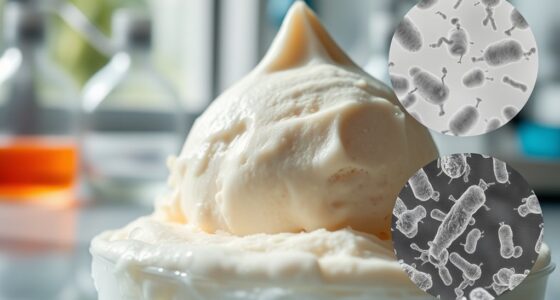Brain freeze is a quick, sharp headache caused by cold foods or drinks touching the roof of your mouth, leading to rapid temperature changes that trigger nerve signals and blood vessel reactions. It’s harmless, even if it feels intense, and usually lasts only a few seconds. To prevent it, eat or sip slowly and press your tongue against the roof of your mouth. Want to find out more about how to stop and prevent brain freeze?
Key Takeaways
- Brain freeze is a brief, sharp headache caused by rapid cold exposure in the mouth affecting blood vessels and nerves.
- It is harmless and temporary, typically lasting only seconds to a minute.
- Prevent by eating or drinking slowly, taking smaller bites, or pressing your tongue against the palate.
- Immediate relief can be achieved by warming the roof of your mouth with your tongue or drinking warm fluids.
- Understanding it as a natural response helps manage discomfort without concern for long-term health effects.

Have you ever experienced a sudden, sharp headache after eating or drinking something cold? That intense, fleeting pain is what many call a brain freeze. It’s that quick cold sensation that hits the roof of your mouth or the back of your throat, causing a sharp headache that can feel almost unbearable. Understanding what causes this sensation can help you manage it better and find effective ways for headache relief.
A sudden cold headache from eating or drinking icy foods can be intense but is easily managed.
When you consume something icy—like a cold drink or ice cream—the rapid drop in temperature causes the blood vessels in your mouth and throat to constrict and then quickly dilate. This sudden change stimulates the nerves in the palate and the surrounding areas. The brain perceives this nerve activity as pain, which is why you feel that piercing headache. The pain is typically brief, lasting only a few seconds to a minute, but it can be intense enough to catch you off guard. The key to preventing or easing a brain freeze lies in controlling that cold sensation before it escalates.
To prevent a brain freeze, you can try eating or drinking more slowly, giving your mouth time to warm up the cold item. Taking smaller bites or sips minimizes the rapid temperature change and reduces the likelihood of triggering a sudden headache. Pressing your tongue against the roof of your mouth is another trick; this action helps warm the area and slow down the nerve response, providing quick headache relief. Breathing through your nose rather than your mouth can also help because it warms the air you breathe, reducing the cold sensation in your mouth and throat. Additionally, understanding the optimal angles for pinball machines can enhance your overall gaming experience, which can be a fun way to distract yourself from discomfort.
If you already feel that icy headache coming on, don’t panic. Instead, act quickly by pressing your tongue or thumb against the roof of your mouth to generate heat and promote blood flow. Drinking warm water or taking small sips of a warm beverage can also help ease the cold sensation and alleviate the headache faster. Remember, brain freeze is harmless in itself, although it can be quite uncomfortable. It’s your body’s way of reacting to a sudden temperature change in the mouth, and with a few simple tricks, you can reduce the pain or even prevent it altogether.
Frequently Asked Questions
Can Brain Freeze Occur in Children and Adults Equally?
You might wonder if both children and adults experience brain freeze equally. Children’s sensitivity is higher, so they often feel it more intensely and quickly. Adults tend to have greater resilience, which can lessen the sensation or delay its onset. While the mechanism is the same, children usually notice brain freeze sooner and more strongly, making their experience more immediate. So, yes, it can occur in both, but the intensity varies.
Does Brain Freeze Indicate Underlying Health Issues?
You might wonder if brain freeze hints at health concerns, but generally, it’s just a quick reaction to cold drinks or dental sensitivity. It’s a common, harmless experience caused by nerves in your mouth and brain. If you notice persistent or severe discomfort, it’s wise to consult a healthcare professional. Usually, though, brain freeze is simply your body’s way of signaling that you’ve enjoyed too much cold refreshment too fast.
Can Brain Freeze Be Used for Medical Diagnosis?
You might wonder if brain freeze can help diagnose health conditions, but it’s not a reliable tool for medical diagnosis. Instead, focus on brain freeze remedies like pressing your tongue against the roof of your mouth or drinking warm liquids. To avoid it, practice cold food precautions, such as eating slowly and limiting cold items. Remember, brain freeze is harmless but isn’t a symptom indicator, so don’t rely on it for medical insights.
Are There Cultural Differences in Experiencing Brain Freeze?
Did you know that about 60% of people worldwide experience brain freeze? Cultural food preferences and regional temperature variations influence how often you get it. For example, colder climates might lead to more frequent episodes, while warmer regions see less. Your personal experiences depend on these factors, making brain freeze a universal sensation, yet uniquely shaped by where and what you eat. So, it varies across different cultures and environments.
How Does Brain Freeze Relate to Migraines?
You might notice that ice cream headaches, or brain freeze, can sometimes trigger migraines because both involve cold stimulus effects on your nerves. When you consume cold foods, the sudden temperature change affects blood vessels and nerves in your head, which can worsen migraine symptoms. If you’re prone to migraines, it’s best to eat cold treats slowly and avoid rapid consumption to minimize the risk of ice cream headaches and potential migraine flare-ups.
Conclusion
Remember, an ounce of prevention is worth a pound of cure. To avoid brain freeze, eat cold treats slowly and warm your palate with your tongue or roof of your mouth. It’s a harmless hiccup, so don’t let it spoil your enjoyment. By being mindful and taking simple precautions, you can indulge in your favorite icy delights without the pain. After all, the best way to enjoy life’s pleasures is to savor them wisely.









